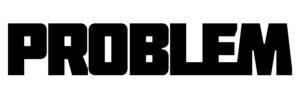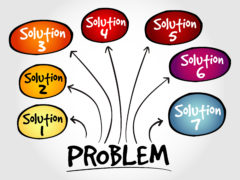BEING A BUSINESS OWNER CAN BE VERY REWARDING!

The BIG 
A disability creates a double disaster and can be devastating. It places an extraordinary burden on any professional business owner. Not only is your personal income threatened, but also your business and its survival.
Being disabled isn’t something anyone wants to think about, let alone the financial consequences, even though it happens more often than one can imagine.
Some types of businesses can continue without you when they don’t depend solely on your income to pay monthly business expenses. However, if your business depends on you to generate revenue, the monthly expenses of your business won’t disappear because you can’t work. You still have an obligation to pay certain fixed business expenses normal to the operation of your business or professional practice.
In addition, while these expenses continue, revenue may be decreasing as clients or patients leave upon hearing of your disability.

WHEN A DISABILITY STRIKES!
How will you pay your ongoing monthly business overhead expenses during a disability?
Where will the money come from?
How will the business or professional practice remain open and for how long?
What are your OPTIONS if the disability is ongoing?

(A) Keep business / practice ongoing — requires the continued payment of monthly overhead expenses.
(B) Close the business / practice — All of your time, effort, and money spent to develop the business or practice will be lost.
(C) Sell the business / practice — If financial considerations require a quick sale of the business / practice, you may be forced to sell at a small percentage of the actual worth.
ALTERNATIVE SOLUTIONS

♦
Deplete savings.
♦
Mortgage your home while placing an additional drain on your already reduced income.
♦
Liquidate investments or retirement plans.
♦
Borrow and go into further debt. Would you lend money to someone disabled?
♦
Relatives and friends. Can you depend on other people for money or loans?
♦
Personal disability insurance. Use your personal disability insurance policy to pay business expenses, which reduces your ability to pay your personal living expenses.
As you can readily see, all these alternative solutions have major drawbacks and create further financial problems. There is only one practical and economical answer.

THE IDEAL SOLUTION!
A business overhead expense policy, commonly referred to as “BOE”.
This coverage pays for all of the deductible overhead expenses of your business on a reimbursement basis, while you are totally or residually (partially) disabled, after a 30, 60 or 90 day waiting period and for up 12, 18 or 24 months. This gives you the ability to keep your business running while you try to get better, and if you’re not able to return to work, you were able to buy time to make financial decisions in the hope of being able to sell the business or practice if that is an option.
TOP REASONS FOR BUSINESS OVERHEAD EXPENSE INSURANCE
♦
Keeps your office open and running until you return to work, and helps in your recovery knowing you have a business or professional practice to return to should the disability be short-term in nature.
♦
How much better will you feel knowing that you have additional money coming in to pay monthly overhead expenses and hire another professional to take care of your customers, clients or patients.
♦
Buys time to consider selling your business or professional practice, if it’s a longer-term disability.
♦
Without this type of income insurance, a disabled professional owner may not have any other option to save the business.

Here are ADVANTAGES, SOLUTIONS, and BENEFITS
provided by a BOE policy.
#1: Premiums are tax-deductible.
One of the unique features of business overhead expense insurance is the tax-deductibility of the premium. While most individual disability insurance policies are not deductible, business overhead expense insurance is regardless of the business entity, i.e. sole proprietor, partner or corporate owner. Overhead expense benefits received during disability, while taxable upon receipt, are used to pay office related business expenses which are tax-deductible. The net tax result is a “wash.” Speak with your tax advisor for more details.
#2: Premiums are very affordable for your business or professional practice.
The benefit periods available for this coverage are short 12, 18, 24 months with 30, 60 or 90-day waiting periods. This provides the business owner sufficient time to decide the fate of the business if the disability is short in duration, the policy proceeds will pay the bills until recovery. If not, these same dollars may keep the business out of significant debt to enable a proper price to be obtained in a sale. Remember the longer the waiting period and the shorter the benefit period, the lower the premium payments.
#3: Covers the balance of gross income.
A personal disability policy covers gross income AFTER business expenses. If a business owner earns $40,000 in gross revenue per month and has $20,000 in business expenses, the balance of $20,000 is insured (at 54 percent) with a personal disability income plan at $10,800. However, if disabled, the $20,000 in monthly overhead expenses will continue and adequate business overhead insurance must be secured to insure total gross income. $20,000 of BOE business overhead expense coverage plus $10,800 of personal coverage insures a substantial portion of the $40,000 gross revenue amount.
#4: High Limits to $30,000 or $50,000 in the domestic marketplace.
Most insurance companies will cover $30,000 to $50,000 of fixed monthly expenses depending on the waiting period from 30, 60 or 90 days and the benefit period from 12 months, 18 months or 24 months. Since these types of policies are “reimbursement policies,” the benefits may extend past the maximum benefit period. For example, let’s say you purchase $30,000 a month of business overhead expense benefits for 12 months. If you only use $20,000 per month for 12 months, you would still have $120,000 available to use.
#5: Keeps the Doors Open.
The loss of the owner (or co-owner) will often directly affect revenue. The appearance that the business is still a viable concern despite this loss is critical in the eyes of the customer. Having a disability policy pay the continuing monthly business expenses can allow the doors to remain open while the owner recovers providing financial and psychological victories that can lead to a speedier recovery.
#6: Waives Your Malpractice Premium.
Do you have a plan that can waive your malpractice premium in the event you become disabled? The BOE policy can do exactly that as malpractice premiums are one of the many covered business expenses.
#7: Helps hire a substitute professional.
Most insurance companies offer an additional benefit that allows you to pay most or all of the salary of a member of your profession to perform the duties previously performed by you. This is especially important for highly skilled business owners such as physicians, dentists, lawyers, etc. If you are unable to work and don’t have someone in your profession perform your duties, your business could collapse. This is an expense not normally covered under the basic policy without including this extra benefit.
#8: The carry-over provision accommodates fluctuating monthly expenses.
Overhead expense benefits reimburse the expenses incurred in keeping your office open during your disability. However, in many practices, these expenses fluctuate, so one month they might be less than the policy benefit, other months more. Having a carry-over provision solves this problem. When monthly expenses are less than the maximum monthly expense benefit, the unused benefits are simply carried over and made available for use in months when expenses exceed the maximum monthly benefit. Under certain conditions, overhead expenses may actually continue to be reimbursed even beyond the indemnity period.
#9: Accumulation of Unused Benefits.
Eligible expenses not covered in a given month will accumulate for payment in later months, subject to the benefit limit provision and other policy terms. While you remain disabled, benefits for that disability are payable until the earlier of:
1) the date and the sum of all benefits paid to you equals the maximum benefit
or
2) the end of the maximum benefit period.
#10: Protects the insured with favorable own occupation definition of disability.
The definition of total disability in a BOE contract states you will be considered totally disabled if, as a result of injury or sickness, you are unable to perform with reasonable continuity the material and substantial acts necessary to pursue your usual occupation in the usual and customary way. If unable to work in that job, eligibility for benefits begins.
#11: The residual (partial) pays a percentage of your monthly overhead expense benefits based on a loss of revenue.
Not all disabilities are “total” and require you to stop working completely. In fact, recovering from a disability often means a gradual return to work.
You are not totally disabled and you are able to perform one or more, but not all of the material and substantial duties of your usual occupation or you are able to perform all of the material and substantial duties of your usual occupation but not for the length of time as usual prior to your injury or sickness.
If you suffer a disability that limits you to part-time work, your practice’s gross revenue may decrease to the point where you cannot meet your office expenses. In such a case you would certainly need help to pay your office bills, just as you would if you suffered a total disability. Yet many overhead expense policies require you to be totally disabled to be eligible for benefits.
To avoid this problem, look for an optional policy provision with “residual benefits” paying the difference between current gross revenue and current expenses if you are partially disabled. These benefits are payable when your practice’s monthly expenses exceed gross income and you have lost at least 15 to 20% of your prior gross monthly revenue depending on the company and BOE policy.
Each company that offers a BOE policy determines and pays residual (partial) benefits in their own way.
#12: Future Purchase Option.
As your business or professional practice grows, expenses are likely to increase. This valuable benefit allows you to purchase more BOE without any proof of medical insurability normally until age 55.
IMPORTANT – WHAT BOE INSURANCE POLICIES GENERALLY DO NOT COVER!
Salaries, fees, drawing accounts, profit or other types of remuneration for you, other business owners, partners, employees brought in to replace the disabled insured, family members, or anyone else that does the same work is not covered. The exception when adding the salary substitute benefit to the policy that pays part of the salary of a professional as a temporary replacement for you, such as another doctor retained to fill in during a total disability.
For example, doctors in the same practice cannot have their salaries paid for if another doctor becomes disabled. BOE plans do not pay out a flat rate for covered business expenses as the costs can fluctuate month to month. Instead, policies are paid out monthly on a reimbursement basis up to the policy monthly benefit / coverage limitations.
Professional overhead expense disability insurance pays additional costs including the salaries of all regular employees except those who are members of your profession. In a medical partnership, for example, salaries for the receptionist and nurse would be covered, but not the salary of your physician partner or physician employee.
The substitute professional must normally be outside of your professional practice, and not include your spouse or domestic partner, a family member, a member of your spouse’s family, a business or professional partner; or any person with whom you share a financial or business interest.
Always read the limitations and exclusions of the BOE policy you are considering.

What’s the difference between an individual disability and business overhead expense policy?
Although BOE insurance works the same as a personal disability insurance policy, they both define illness and injury the same and require the insured to satisfy a waiting period. The difference a business owner who is permanently disabled can have an individual disability policy pay personal living expenses to age 70. However, business overhead expense insurance reimburses business expenes up to 2 years maximum. The only other options may be to sell or let the business or professional practice dissolve if the disability lasts longer.

Plan ahead with business overhead expense protection. Let’s create a tailor-made plan to fit your personal overhead expense needs.

How much would you need to adequately cover your reasonable monthly business overhead expense obligations?
Mortgage, Lease or Rent Payments
Taxes on Business Property
Salaries of Employees
Employer-Paid Benefits
Installments on Furniture or Equipment
Installment Principal / Interest on Business Debts
Utilities
Telephone / Internet
Property, Liability or Malpractice Insurance
Accounting, Billing and Collection Fees
Professional and Business Dues
Subscriptions
Postage
Others Miscellaneous Expenses
TOTAL
________________
________________
________________
________________
________________
________________
________________
________________
________________
________________
________________
________________
________________
________________
$$$
________________
How long could you go before you need to receive this benefit?
30 days
60 days
90 days
How long would you like benefits payable?
12 months
18 months
24 months

